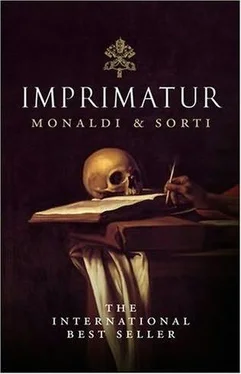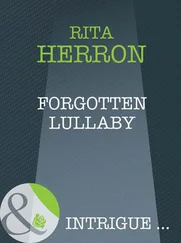Rita Monaldi - Imprimatur
Здесь есть возможность читать онлайн «Rita Monaldi - Imprimatur» весь текст электронной книги совершенно бесплатно (целиком полную версию без сокращений). В некоторых случаях можно слушать аудио, скачать через торрент в формате fb2 и присутствует краткое содержание. Жанр: Исторический детектив, на английском языке. Описание произведения, (предисловие) а так же отзывы посетителей доступны на портале библиотеки ЛибКат.
- Название:Imprimatur
- Автор:
- Жанр:
- Год:неизвестен
- ISBN:нет данных
- Рейтинг книги:5 / 5. Голосов: 1
-
Избранное:Добавить в избранное
- Отзывы:
-
Ваша оценка:
- 100
- 1
- 2
- 3
- 4
- 5
Imprimatur: краткое содержание, описание и аннотация
Предлагаем к чтению аннотацию, описание, краткое содержание или предисловие (зависит от того, что написал сам автор книги «Imprimatur»). Если вы не нашли необходимую информацию о книге — напишите в комментариях, мы постараемся отыскать её.
Imprimatur — читать онлайн бесплатно полную книгу (весь текст) целиком
Ниже представлен текст книги, разбитый по страницам. Система сохранения места последней прочитанной страницы, позволяет с удобством читать онлайн бесплатно книгу «Imprimatur», без необходимости каждый раз заново искать на чём Вы остановились. Поставьте закладку, и сможете в любой момент перейти на страницу, на которой закончили чтение.
Интервал:
Закладка:
2499 0 55 0 71 11 37 18 16
34 73 93 39 0 29 22 76 18
22 97 97 37 98 38 2575
5 36 14 34 0 76 13 84 18
79 69 2347 94 18 22 19 19
14 78 2316 97 48 94
36 34 37 14 18 71 71 73
18 22 97 46 39 37 46
88 48 71 19 34 37 76 16 37
18 0 98 46 18 13 13 48 39
93 0 34 94 20 97 14 77 76
36 14 38 69 2610 555
48 2336 0 55 64 0 16
37 71 73 39 0 16 44 48 16
39 14 19 14 18 81 0 34 31
22 18 16 73 34 48 79 71…
And so on, for twelve pages, with a total of twenty-four columns like that reproduced here. It was a letter in cipher, and at first I despaired of understanding anything.
Fortunately, however, the ciphers used in the letter were those habitually employed at the time by the Vatican Secretariat of State. I therefore compared the letter with other deciphered letters and succeeded at length in decoding a brief preliminary passage: unsudditofedelissimodellasantasedeedibvontalentogentilhvomoavignon ese, mihafattopervenireunalettera, aluiscrittadavnsvdditodelprincipedeoranges…
It took me days of work to obtain a correct and legible version of the text. I was, moreover, compelled to keep a number of indecipherable terms in figures, but these were fortunately not necessary for understanding the text. It was a letter from Monsignor Cenci, Papal Vice-Legate of Avignon, who was writing to Rome in order to describe a strange negotiation:
A most faithful Subject of the Holy See and one of goodly Talents, a Gentleman of Avignon, has passed to me a Missive, sent to him by a Subject of the Prince of Orange, which tells of the great Desire of the Subjects of that Principality to come under the Dominion of the Holy See…
If he speaks to me of that Matter, I shall listen to and report all that he tells me, nor shall I accept or reject 2657. It seems there can be no Doubt but that this is being done with the Agreement of the House of Orange…
My Ministry has obliged me to communicate what I know concerning this exceedingly important Negotiation. The enclosed Folio contains a Copy of the aforementioned Letter, which was written to Signor Salvador, Auditor of the Rota of Avignon, by Monsieur de Beaucastel, Gentleman, of Courteson…
Here was what had happened: Monsieur de Beaucastel, a gentleman of the small town of Courthezon and a subject of the Prince of Orange, had first contacted a priest at Avignon, the Auditor of the Rota Paolo de Salvador, and then Vice-Legate Cenci. Beaucastel was the bearer of a proposal which was, to say the least, surprising: the Principality of Orange desired to offer itself to the papacy. I was astonished: how could the subjects of William of Orange, who were, for the most part Protestants, wish to give themselves to the papacy? And how could they be so sure that William would consent thereto?
Rummaging further in the correspondence between Rome and Avignon, I found the other letters exchanged between Cenci and the Vatican Secretariat of State, and even the initial missive from Beau- castel to Salvador. At the risk of seeming over-meticulous, I note that these documents, hitherto unknown to historians, are to be found in the Secret Archives of the Vatican, Fondo segreteria di Stato — legazione di Avignone-. folder 369 (Monsieur de Beaucastel to Paolo de Salvador, 4th October, 1689), folder 350 (two letters from Monsignor Cenci to the Vatican Secretariat of State, undated, and one from Cardinal Ottoboni to Cenci, dated 6th December, 1689) and in folder 59 (Monsignor Cenci to Cardinal Ottoboni, 12th December, 1689).
The few letters in cipher were all accompanied by their decoded version. I noted with surprise, however, that the only one which I had translated-the first and most important of all-was not thus accompanied. It was as though someone, in view of the extreme gravity of the contents, had arranged for the disappearance of the deciphered version… Moreover, the letter was not in its proper place, far from the packet of letters which contained the other missives.
Despite the difficulties, I succeeded at long last in reconstructing an extraordinary story, which no historian had yet brought to light.
The motive for the citizens of Orange wishing to come under the papal flag was as simple as it was troubling. William of Orange had accumulated a mountain of debt to Innocent XI; and the subjects of Orange, who had already had to disburse a great deal of money to the papacy, thought that they could best resolve their problems by directly offering their own annexation to the state of the Church: "Here in the Kingdom," writes Monsignor Cenci, "it is quite widely believed that the Prince of Orange still owes the previous pontificate large sums, in payment whereof he believes he can offer possession of a State from which he can gain little capital."
Precisely for that reason, however, not all the subjects of Orange were in agreement: "In the Past, we have already given too much Money to the Church!" protested Monsieur de Saint-Clement, former Treasurer of the Principality.
In Rome, however, Beaucastel's proposal was coldly turned down. The Secretary of State, Cardinal Rubini, and the nephew of the new
Pope, Cardinal Ottoboni, ordered Cenci to reject the embarrassing offer. It could not be otherwise: the new Pope knew absolutely nothing about such debts. It was, moreover, out of the question that the glorious Pope Innocent XI might have lent money to a heretic prince…
I was deeply shocked. The letters found in the Secret Archives of the Vatican confirmed what Dulcibeni had revealed to the young apprentice: William of Orange had been in debt to Innocent XI. Not only that: if the Prince of Orange did not pay up, that would result in the seizure of his personal property. Indeed, the debt had become so high that William's possessions and his subjects considered spontaneously donating themselves!
I could not, however, remain content with this. I had to find confirmation of the declarations of the subjects of Orange. I therefore needed to clarify my ideas about William: where did he obtain the money to finance his warlike undertakings? And who had financed the invasion of England?
All the histories of the Glorious Revolution, as the coup d'etat whereby the Prince of Orange grabbed the throne of England is now called, sing from the same hymnal: William is good, William is strong, William is so idealistic and disinterested that he does not even want to become King!
If we are to believe the historians, the valiant William seems to have lived on air: but who on earth had given him, since his youth, the wherewithal to fight and to defeat the armies of Louis XIV? Someone must have found him the money to pay for the munitions, the mercenaries (who in those days accounted for the greater part of all armies), the cannons and a few generals worthy of the name.
All the European monarchs then bogged down in wars were beset by the same problems of finding money with which to finance them. The Prince of Orange, however, had an advantage: if there was one city in which money circulated in the seventeenth century-a great deal of money-it was Amsterdam, where, not by chance, the banks of Jewish moneylenders flourished. The capital of the United Provinces was the richest financial market in Europe, just as Cloridia, and later the other guests, told the apprentice of the Donzello.
I consulted a few good books on economic history and discovered that, in the days of William of Orange, a good many of the businessmen in Amsterdam were Italian. The city was full of names like Tensini, Verrazzano, Balbi, Quingetti, and then there were the Burlamacchi and the Calandrini who were already present in Antwerp (almost all of whom were mentioned in the apprentice's tale, first by Cloridia, then by Cristofano). They were Genoese, Florentine, Venetian, all merchants and bankers, some also agents of Italian Principalities and Republics. The most enterprising had succeeded in penetrating the closed circle of the Amsterdam aristocracy. Others were well placed in the lucrative but perilous slave trade: such was the case of Francesco Feroni.
Читать дальшеИнтервал:
Закладка:
Похожие книги на «Imprimatur»
Представляем Вашему вниманию похожие книги на «Imprimatur» списком для выбора. Мы отобрали схожую по названию и смыслу литературу в надежде предоставить читателям больше вариантов отыскать новые, интересные, ещё непрочитанные произведения.
Обсуждение, отзывы о книге «Imprimatur» и просто собственные мнения читателей. Оставьте ваши комментарии, напишите, что Вы думаете о произведении, его смысле или главных героях. Укажите что конкретно понравилось, а что нет, и почему Вы так считаете.












